Retinoids (vitamin A derivatives) are by far the most raved-about ingredients by both dermatologists and skincare junkies. They’re absolutely fantastic for treating both acne and the signs of aging skin.
Unfortunately, retinoids tend to be irritating for most people, turning your face into a dry peeling mess if you’re too heavy-handed (me, a lot of the time). That’s why there’s a lot of excitement around bakuchiol and babchi oil.
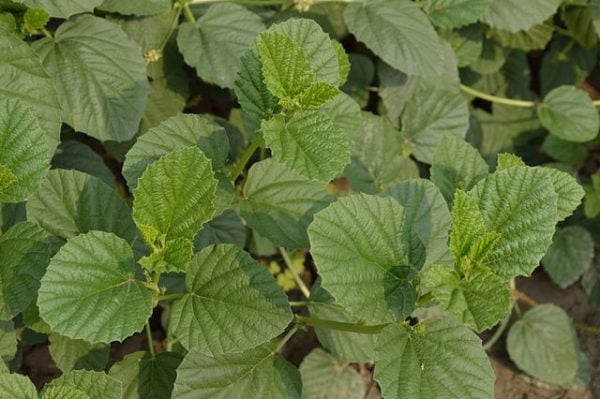
But does it really deserve this comparison? Let’s look at the science.
Is bakuchiol as antiaging as retinol?
There’s one recent open-access independent clinical study, published in the British Journal of Dermatology, that’s particularly impressive. It’s a randomised double-blind trial that lasted 12 weeks, in which 44 people applied either 0.5% bakuchiol cream twice a day, or 0.5% retinol cream once a day on their faces.
Bakuchiol and retinol reduced wrinkle surface area (based on computer analysis) and hyperpigmentation (based on computer analysis and a dermatologist’s grading) to a similar extent. However, people using retinol had more peeling and stinging, while those using bakuchiol had more redness. There wasn’t any photosensitivity in the bakuchiol group.
(Some descriptions of this study missed the fact that bakuchiol was applied twice a day, while retinol was only applied once a day. While this does demonstrate that bakuchiol is much less irritating, it doesn’t show that it’s as effective as retinol, since twice as much was used.)
Related post: My Routine for Starting on Tretinoin (Retin-A) Cream (with video)
However, while impressive, these results aren’t super exciting on their own – there have been other ingredients that have been found to work similarly to retinoids to decrease the signs of aging in studies that didn’t get the same hype.
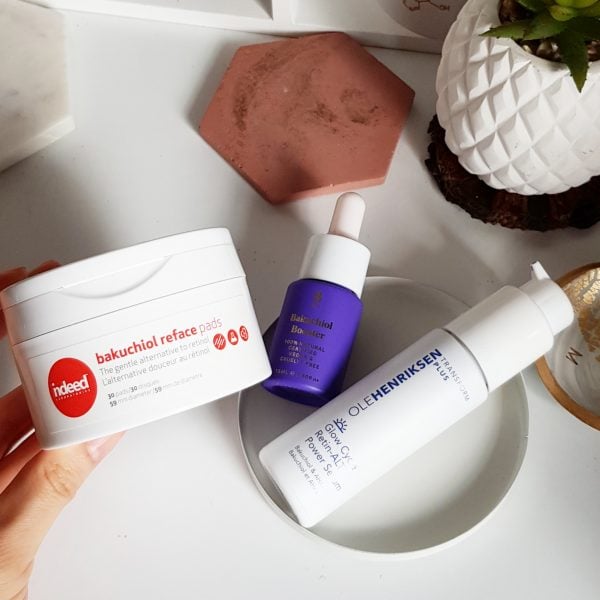
Does bakuchiol act like retinol?
It’s really the in vitro studies that raised the hype bar for bakuchiol.
In a paper published in 2014 (by the founder of the company that sells bakuchiol), the gene expression of bakuchiol was found to be similar to retinol according to a DNA microarray study using full thickness skin models (they displayed similarly shaped volcano plots). This means that there are similarities in how they affect cell pathways. The same study found that bakuchiol and retinol also stimulated collagen in cell studies.
In another study, the same researchers found that bakuchiol was better than retinol at slowing down the activity of two matrix metalloprotease enzymes that break down collagen and elastin, MMP-1 and MMP-12.
However, interestingly, bakuchiol doesn’t seem to act via the retinoic acid receptors (which isn’t that surprising to me as a medicinal chemist – while bakuchiol superficially resembles retinol and tretinoin structurally, its six-membered ring is aromatic and flat, and the oxygen is on the other end of the molecule).
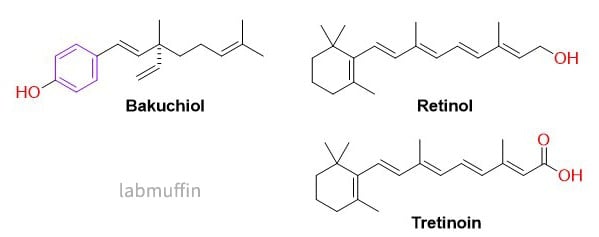
It’s also worth remembering that retinol also needs to be oxidised to retinoic acid (tretinoin) to be active in skin. Whether this process occurs in the in vitro studies to a similar extent as in living human skin is questionable.
A more direct comparison would’ve been bakuchiol vs tretinoin, since tretinoin is already in its active form, but the authors don’t explain why they picked retinol instead.
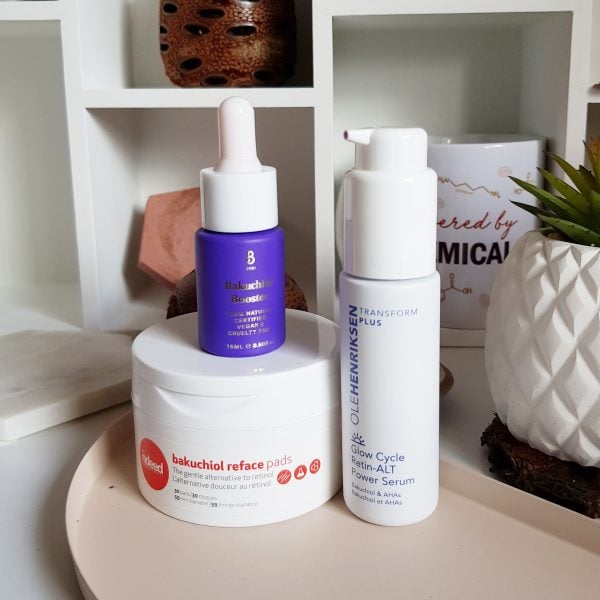
Bakuchiol does have some additional advantages compared to retinol. As well as better tolerability, it’s also been found to have antimicrobial effects in vitro.
Like retinoids, it’s antioxidant and anti-inflammatory. It’s used in some Bioderma products to prevent the oxidation of squalene in sebum, which is thought to contribute to clogged pores. It’s also more stable than retinol, and has been found to increase retinol’s stability.
However, since it’s a natural ingredient, bakuchiol is more likely to trigger allergic reactions than synthetic retinoids, especially if it’s included as a natural extract.
Related post: Video: Are Natural Beauty Products Better?
Why bakuchiol can’t compare with retinoids
Here’s the single biggest problem with the retinoid comparison:
The main reason for the huge clout that retinoids get in skincare is the wealth of evidence that support their use. The earliest studies on tretinoin date back to the 1970s. There are hundreds of high quality clinical trials on the benefits of tretinoin for skin, which is why it’s often referred to as a “gold standard”.
While the evidence for retinol is a bit weaker, it inherits some of the clout since we know it’s converted to tretinoin in the skin.
But for bakuchiol? The evidence is weak compared to many of the standard skincare ingredients like alpha hydroxy acids and vitamin C, let alone retinoids. But it’s a very attractive marketing story.
Verdict
Bakuchiol is a promising skincare ingredient, and could be a valuable addition to your skincare routine, but you shouldn’t replace your retinoids with it.
If you have skin that can’t handle retinoids, or if you’re pregnant, bakuchiol might be a safer choice. But in terms of robust evidence for effectiveness, it’s nowhere near retinoids.
Products with Bakuchiol
Biossance Squalane Phyto-Retinol Serum
Ole Henriksen Glow Cycle Retin-ALT Power Serum
Indeed Labs Bakuchiol Reface Pads
References
Dhaliwal S et al., Prospective, randomized, double-blind assessment of topical bakuchiol and retinol for facial photoageing (open access), Br J Dermatol. 2019, 180, 289-296. DOI: 10.1111/bjd.16918.
Chaudhuri RK & Bojanowski K, Bakuchiol: a retinol-like functional compound revealed by gene expression profiling and clinically proven to have anti-aging effects, Int J Cosmet Sci. 2014, 36, 221-30. DOI: 10.1111/ics.12117.
Chaudhuri RK, Bakuchiol; A retinol-like functional compound modulating multiple retinol and non-retinol targets, In Cosmeceuticals and Active Cosmetics, 3rd Edition, RK Sivamani, J Jagdeo, P Elsner & HI Maibach (eds), Francis & Taylor, Boca Raton, 2015.
Some of these products were provided for editorial consideration, which did not affect my opinion. This post also contains affiliate links – if you decide to click through and support Lab Muffin financially (at no extra cost to you), thank you! For more information, see Disclosure Policy.


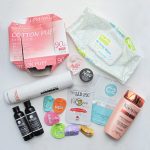

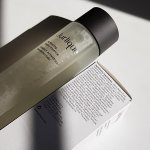

There seems to be a very promising product, Altreno lotion, just approved in the USA. It’s a non-irritating retinoid with a different vehicle. Would you make a post on this release? Thank you.
Thanks so much for taking the time to review evidence, Michelle. I shall now sally forth replete in the knowledge that retinoids are STILL the gold standard! When I parrot what I’ve learned, I always say it’s from a PhD in chemistry! Bragging rights!
I have a question about babchi oil. A vlogger that I follow started using it, thinking it was the same as bakuchiol, but found that it caused some unwanted hair growth on her face. Is this a known side effect of babchi oil? Could it be used on the scalp to aid hair growth? Thanks.
I’ve never heard of this side effect! Maybe you can look up if it’s been mentioned in some reviews?
Thank you for this post, I aways appreciate your input on new hyped ingredients! You’ve mentioned before that you would do a post on red light therapy, are you still planning to do that?
Eventually! Unfortunately the potential topic list is very very long… if only I had more time!
I totally understand! I’ll await it patiently, looking forward to it! =)
I’m confused with how it’s less irritating but causes redness? What causes the redness? I was going to try the pads from Indeed Labs, but I have natural redness and a wee bit of rosacea and I make every effort to avoid anything that boosts redness!
I meant to also say that I use a gentle Retinol from the Ordinary (granactive retinol) and it seems fine (doesn’t irritate or increase redness) so I may just stick with that 🙂 I didn’t realize retinol was anti-inflammatory and an antioxidant, I was looking for something that but I’ve got that with retinol …!
There haven’t been any studies that would tell us the mechanism – there just isn’t much info on bakuchiol at all.
Exactly my thoughts – I think it is a great one to try if your skin is so sensitive that you just can´t use any retinoids, but as someone that tolerates retinoids well, I don´t see any reason to switch.
Anne from “Doctor Anne” (former Linda, Libra, Loca)
Thank you for this evidence-based comparison. Now we know that retinols are still more powerful ingredients for anti-aging.
“However, since it’s a natural ingredient, it’s also possible to be allergic to bakuchiol.” Hm, so you claim that nobody can be allergic to a synthetic ingredient? Interesting… I smell anti-natural attitude here. Last time allergies were mentioned, it was something like “Since natural products are not a single chemical substance, there is a higher probability of allergic reaction – simply for the reason of more different substances being present. The shorter “real” ingredient list, the statistically safer.” which I completely agree with.
Good point – I could’ve been more precise with my wording! Although IMO the updated version would be more “anti-natural”, since the first wording doesn’t say anything about the relative allergenicity of synthetic ingredients 🙂
I have heard that bakuchiol is deactivated by clay. Is that true?
> In a paper published in 2014 (by the founder of the company that sells bakuchiol),
Who is the founder, and what company did they found? I tried searching myself and can’t find anything. That’s an extremely important conflict of interest to detail.
The paper is hyperlinked in that sentence, it’s the 2014 Int J Cos Sci article. Ratan Chaudhuri is a founder of Syntheon according to his LinkedIn profile.